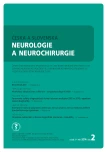-
Medical journals
- Career
Evaluation of Volume Response of Low Grade Glioma to Radiochemotherapy treated for Inoperable Progression or Residual Tumor
Authors: R. Bartoš 1,2; F. Třebický 3; A. Malucelli 1,2; A. Hejčl 1,2; J. Zárubová 4; D. Hořínek 1,2; R. Peter 2; M. Sameš 1
Authors‘ workplace: Neurochirugická klinika Masarykovy nemocnice, Ústí nad Labem 1; Mezinárodní centrum klinického výzkumu, FN u sv. Anny v Brně 2; Ústav radiační onkologie, Nemocnice Na Bulovce, Praha 3; Neurologické oddělení, Thomayerova nemocnice, Praha 4
Published in: Cesk Slov Neurol N 2014; 77/110(2): 216-222
Category: Short Communication
Overview
Aim:
Evaluation of low-grade glioma clinical and volume response to concomitant and adjuvant chemo-radiotherapy.Material and methods:
We describe a series of seven patients (five men and two women) with defined progression or an inoperable residual tumor after low-grade glioma surgery. Tumor volume regression was evaluated by means of manual computer volumetry.Results:
Using computerized volumetric quantification in our pilot set of patients, we observed mean 90% (73–100%) reduction in tumor volume on T1W MRIs and 73% (41–100%) reduction of tumor volume on T2W MRIs. Following cancer treatment, regression of epileptic seizures occurred in three patients, Jacksonian sensory epileptic seizures stayed stable in one patient.Conclusion:
Combined cancer treatment in patients with inoperable low-grade glioma WHO grade II with low proliferation activity could lead to substantial tumor volume regression in a significant proportion of patients.Key words:
low-grade glioma – chemotherapy – radiotherapy – temozolomide – computer volumetry
The authors declare they have no potential conflicts of interest concerning drugs, products, or services used in the study.
The Editorial Board declares that the manuscript met the ICMJE “uniform requirements” for biomedical papers.
Sources
1. Třebický F, Kubeš J, Bartoš R, Malucelli A, Sameš M et al. Léčba nízkostupňového gliomu supratentoriální oblasti mozku po neurochirurgické subtotální resekci s projevy objemového up ‑ gradingu. Klin Onkol 2012; 25(4): 294 – 298.
2. Macdonald DR, Cascino TL, Schold SC jr, Cairncross JG.Response criteria for phase II studies of supratentorial malignant glioma. J Clin Oncol 1990; 8(7): 1277 – 1280.
3. Bartoš R, Sameš M, Zolal A, Radovnický T, Hejčl A, Vachata P et al. Resekce insulárních gliomů – volumetrické hodnocení radikality. Cesk Slov Neurol N 2009; 72/ 105(6): 534 – 541.
4. Ricard D, Kaloshi G, Amiel ‑ Benouaich A, Lejeune, Marie Y, Mandonnet E et al. Dynamic history of low ‑ grade gliomas before and after temozolomide treatment. Ann Neurol 2007; 61(5): 484 – 490.
5. Brada M, Viviers L, Abson C, Hines F, Britton J,Ashley S et al. Phase II study of primary temozolomide chemotherapy in patients with WHO grade II gliomas. Ann Oncol 2003; 14(12): 1715 – 1721.
6. Hoang ‑ Xuan K, Capelle L, Kujas M, Taillibert S, Duffau H, Lejeune J et al. Temozolomide as initial treatment for adults with low ‑ grade oligodendrogliomas or oligoastrocytomas and correlation with chromosome 1p deletions. J Clin Oncol 2004; 22(15): 3133 – 3137.
7. Kaloshi G, Benouaich ‑ Amiel A, Diakite F, Taillibert S,Lejeune J, Laigle ‑ Donadey F et al. Temozolomide for low ‑ grade gliomas: predictive impact of 1p/ 19q loss on response and outcome. Neurology 2007; 68(21); 1831 – 1836.
8. Taal W, Dubbink HJ, Zonnenberg CB, Zonnenberg BA, Postma TJ et al. First‑line temozolomide chemotherapy in progressive low ‑ grade astrocytomas after radiotherapy: molecular characteristics in relation to response. Neuro Oncol 2011; 13(2): 235 – 241.
9. Pouratian N, Gasco J, Sherman JH, Shaffrey ME, Schiff D. Toxicity and efficacy of protracted low dose temozolomide for the treatment of low grade gliomas. J Neurooncol 2007; 82(3): 281 – 288.
10. Tosoni A, Franceschi E, Ermani M, Bertorelle R, Bonaldi L, Blatt V et al. Temozolomide three weeks on and one week off as first line therapy for patients with recurrent or progressive low grade gliomas. J Neurooncol 2008; 89(2): 179 – 185.
11. Pace A, Vidiri A, Galiè E, Carosi M, Telera S, Cianciulli AM et al. Temozolomide chemotherapy for progressive low ‑ grade glioma: clinical benefits and radiological response. Ann Oncol 2003; 14(12): 1722 – 1726.
Labels
Paediatric neurology Neurosurgery Neurology
Article was published inCzech and Slovak Neurology and Neurosurgery

2014 Issue 2-
All articles in this issue
- Autonomic Dysreflexia – a Serious Complication of Spinal Cord Injury
- Orthostatic Hypotension as a Multifactorial Abnormality after Cervical Spinal Cord Injury
- A Comparison of the Validity of the McDonald Diagnostic Criteria for Multiple Sclerosis 2005 vs 2010 in the Clinical Practice
- Development of Neurological and Functional Clinical Picture after Spinal Cord Injury
- Correlation between Brain Tissue Oxygen Monitoring Parameters and Transcranial Dopplerometry in Patients with Severe Subarachnoid Hemorrhage
- Grammaticality Judgement in Broca’s Aphasia – Two Case Studies
- Normative Values of Nerve Conduction Studies of the Ulnar and Median Nerves Measured in a Standardized Way
- Evaluation of Volume Response of Low Grade Glioma to Radiochemotherapy treated for Inoperable Progression or Residual Tumor
- Influencing the Auditory Pathway in Patients with Vestibular Schwannoma Treated with Gamma Knife Radiosurgery
- REaDY – Czech Registry of Muscular Dystrophies
- Methanol Intoxication on Magnetic Resonance Imaging – Case Reports
- Cervical Epidural Abscess – Two Case Reports
- Dravet Syndrome: Severe Myoclonic Epilepsy in Infancy – Case Reports
- Nemaline Myopathy Associated with Monoclonal Gammopathy – a Case Report
- Neuromodulation
- Alcohol Withdrawal Syndrome and Delirium – from its Pathophysiology to Treatment
- Cerebral Vasospasms Following Subarachnoid Bleeding – Diagnosis, Monitoring and Treatment Options
- Czech and Slovak Neurology and Neurosurgery
- Journal archive
- Current issue
- Online only
- About the journal
Most read in this issue- Autonomic Dysreflexia – a Serious Complication of Spinal Cord Injury
- Dravet Syndrome: Severe Myoclonic Epilepsy in Infancy – Case Reports
- Normative Values of Nerve Conduction Studies of the Ulnar and Median Nerves Measured in a Standardized Way
- Neuromodulation
Login#ADS_BOTTOM_SCRIPTS#Forgotten passwordEnter the email address that you registered with. We will send you instructions on how to set a new password.
- Career

